Best Medical Alert System for Rural Areas IN 2024
In the tranquility of rural living, accessibility to immediate healthcare services can be a challenge. This fact makes a reliable medical alert device not just an accessory but a necessity for individuals, especially seniors or those with health conditions.
Best Comprehensive Coverage
Top Pick For User-Friendly Features
Excellence In Versatility And Customizability
Prime Choice For Mobile Monitoring
Brio House is an independent review site. We may earn money when you click links inside our site.
In the tranquility of rural living, accessibility to immediate healthcare services can be a challenge. This fact makes a reliable medical alert device not just an accessory but a necessity for individuals, especially seniors or those with health conditions. These systems act as lifelines, connecting them to emergency services with a button. They promise peace of mind, knowing that help can be summoned quickly and efficiently, even in the most secluded areas.
Choosing the best medical alert services for rural areas involves considering a unique set of criteria. Given the potential distance from emergency services and sometimes inconsistent cellular service, the best systems for these areas must have reliable connectivity, precise location tracking capabilities, and a quick response time. The search for the ‘best’ is about finding a system that effectively bridges the distance, bringing the reassurance of safety into the heart of rural homes.
Understanding Medical Alert Systems
What a Medical Alert System Is?
A medical alert system, often called a personal emergency response system, is designed to signal the presence of a hazard requiring urgent attention. Primarily utilized by seniors and those with chronic medical conditions, these systems empower users to live independently while having instant access to emergency assistance when necessary.
How do Medical Alert Systems Work?
The standard medical alert system consists of two core components: a home base unit and a wearable device, such as a pendant or wristband. The wearable device features a button that, when pressed, sends a signal to the base unit, which then communicates with a monitoring center. This center is staffed 24/7 by trained professionals who can assess the situation and, if necessary, dispatch emergency personnel to the user’s location.
Mobile Medical Alert Systems vs. In-Home Systems
While the mechanism is similar, there are distinct differences between mobile medical alert devices and in-home systems. An in-home system relies on a landline or cellular connection to the base unit placed within the home. It works well for those spending most of their time indoors.
On the other hand, a mobile medical alert device provides more flexibility. They use GPS technology and a cellular connection, functioning anywhere with a sufficient cellular signal. A mobile medical alert system often comes equipped with additional features like optional fall detection and tracking location services, making them an excellent choice for active users.
Importance of Medical Alert Systems for Emergency Situations
Medical alert systems are crucial in providing prompt assistance during emergencies, particularly in remote or rural areas where immediate help may not be readily accessible. Here are several reasons why these systems are so important:
- Rapid Emergency Response: Medical alert systems are designed to offer instant communication to a 24/7 monitoring center. In an emergency, a quick response is vital, and these systems ensure that the user has a direct line to help when needed. Upon receiving an alert, the monitoring center can immediately contact emergency services, facilitating faster response times.
- Automatic Fall Detection: One of the critical features of many modern medical alert systems is automatic fall detection. Falls are a leading cause of injury among the elderly, and in many cases, the individual may be unable to call for help themselves. An automatic fall detection feature can sense when a user has fallen and automatically send an alert to the monitoring center.
- Emergency Services Locator: Many GPS medical alert devices are vital in rural areas where homes may be spread out. This feature helps emergency services locate the individual in need more rapidly, even if they cannot communicate their location.
- Peace of Mind: Perhaps one of the most significant benefits of having a medical alert device is the peace of mind it brings to users and their families. Knowing that help is just a button press away can reduce anxiety and fear, encouraging independence and confidence in daily activities.
- Medical Monitoring: Some medical alert providers offer additional monitoring services, such as heart rate monitoring or alerts for missed medication. This feature can help prevent medical emergencies by alerting users to potential health issues before they become severe.
The importance of medical alert systems in emergency situations cannot be overstated. They provide a critical lifeline to individuals, ensuring that even in an emergency, help is not far away.

Key Features of a Good Medical Alert System for Rural Areas
Certain features are paramount when choosing the best medical alert company for rural areas. These include:
Reliable Cellular Service
In rural areas, having a stable and reliable cellular connection is vital. The system must maintain strong connectivity to ensure that the distress signal reaches the monitoring center without fail, even in areas with weaker cell service.
Medical Alert System with GPS Technology for Location Tracking
GPS technology enables the monitoring center to accurately pinpoint the user’s location during an emergency, which is crucial when emergency responders are unfamiliar with rural addresses or when the user is unable to speak.
Automatic Fall Detection
Some medical alert devices have a built-in automatic fall detection feature. In the event of a fall, where the user might be unconscious or unable to press the button, the device detects the fall and sends an alert to the monitoring center automatically.
Battery Life of Mobile Devices
The power supply can sometimes be unreliable in remote areas. Thus, having a mobile device with a long-lasting battery life is crucial to ensure that the system remains operational even during power outages.
Two-Way Communication
This feature allows the user to communicate directly with the monitoring center’s representative, providing crucial information about their condition and reassuring them that help is coming.
The Role of Medical Alert System Providers in Maintaining the Quality of Service
Medical alert system providers play a vital role in ensuring that users benefit from their services. Here’s a closer look at their roles:
- Equipment Setup and Testing: The initial setup and testing of the equipment are crucial to ensure it works as intended. The provider’s technicians install the system and guide users through its operation, ensuring they understand how to use it effectively in an emergency. Regular system testing is also performed to ensure that all system components are functioning correctly.
- 24/7 Monitoring Services: Medical alert system providers operate monitoring centers staffed 24/7 by trained professionals. These operators are on hand to respond to alerts, connect users with emergency services, and stay on the line until help arrives, providing reassurance and guidance in stressful situations.
- Maintenance and Upgrades: Providers are responsible for maintaining the equipment to ensure it operates reliably. This includes battery checks for wearable devices and system updates for mobile applications. Additionally, providers must upgrade systems to include the latest features as technology advances, ensuring customers can access the most reliable and useful tools.
- Training Response Teams: The quality of service provided largely depends on the response team’s efficiency. Providers are responsible for training these teams to handle emergencies effectively, which involves understanding the user’s medical history, remaining calm in stressful situations, and providing clear instructions.
- Customer Service: Providers should also have strong customer service, promptly addressing user concerns or issues. This includes helping users understand their service, troubleshooting problems, and assisting with equipment upgrades or replacements.
- Staying Current with Technology: Technology evolves quickly, and it’s up to the provider to stay abreast of these changes. This might involve integrating new features into their systems, such as more accurate fall detection or improved GPS tracking.
In essence, the role of medical alert system providers extends beyond the product itself. They are responsible for ensuring a seamless, reliable service that users can trust in times of emergency. Their commitment to maintaining quality service is fundamental to the health and safety of their customers, particularly in rural areas where timely emergency response is vital.

Can medical alert systems be used outside the home?
Yes, many medical alert systems offer mobile systems that can be used on the go. These systems use a cellular connection to communicate with the monitoring center, and many include GPS tracking so the user’s location can be determined in an emergency.
What are the Top Medical Alert Systems Suitable for Rural Areas in 2024?
- Bay Alarm Medical: “The Best Comprehensive Coverage”
- Medical Guardian: “Top Pick for User-Friendly Features”
- GetSafe: “Excellence in Versatility and Customizability”
- MobileHelp: “Prime Choice for Mobile Monitoring”
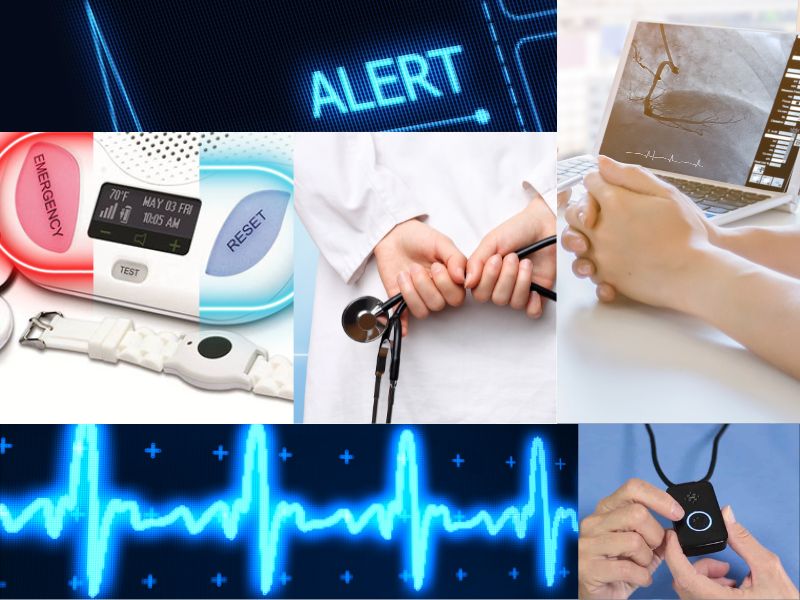
In-Depth Review of Top Medical Alert Systems Suitable for Rural Areas in 2024
The year 2023 has seen significant advancements in the medical field, with numerous medical alert system options introducing innovative features and services designed specifically for users in rural areas. Many medical alert companies stand out for their commitment to quality, reliability, and advanced technology: Bay Alarm Medical, Medical Guardian, GetSafe, MobileHelp, and One Call Alert.
1. Bay Alarm Medical
Best Comprehensive Coverage
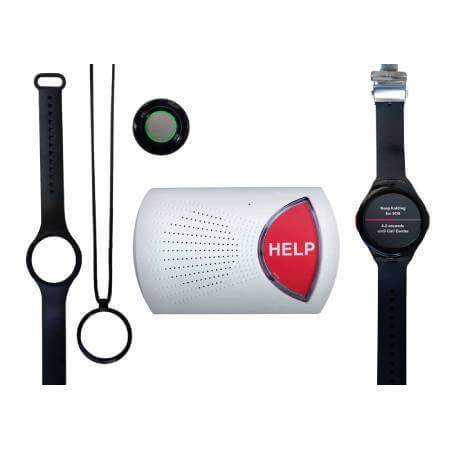
Bay Alarm Medical
Our Rating:

5.0
Features:
- GPS Help Button: Allows for precise location tracking in an emergency, ensuring rapid response even in remote locations.
- Extended Battery Life: Offers up to five days of use on a single charge, providing peace of mind that the device won’t run out of power when it’s most needed.
- 24/7 Professional Monitoring: Highly-trained operators provide round-the-clock assistance and stay on the line until help arrives.
- Automatic Fall Detection: Optional feature automatically sends an alert if a fall is detected.
- Optional Caregiver Tracking: Provides real-time updates on the user’s location and activity, giving caregivers peace of mind.
PROS
CONS
2. Medical Guardian
Top Pick for User-Friendly Features
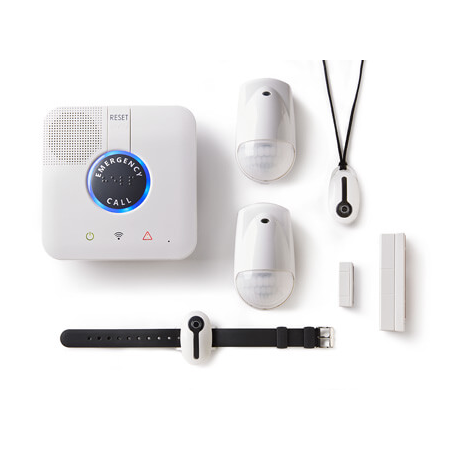
Medical Guardian
Our Rating:

4.7
Features:
- Freedom Guardian Medical Alert Watch: This wearable device provides a discreet way of having 24/7 protection, with GPS and Wi-Fi capabilities.
- Comprehensive Mobile App for Caregivers: Gives caregivers access to important information like location updates and alert notifications.
- Two-Way Communication: Enables direct communication with the monitoring center directly through the wearable device.
- Weather Forecast: Freedom Guardian offers weather updates, aiding in planning for outdoor activities.
- Reminders: The device can be programmed to remind users about medication times, doctors’ appointments, and other important tasks.
PROS
CONS
3. GetSafe
Excellence in Versatility and Customizability
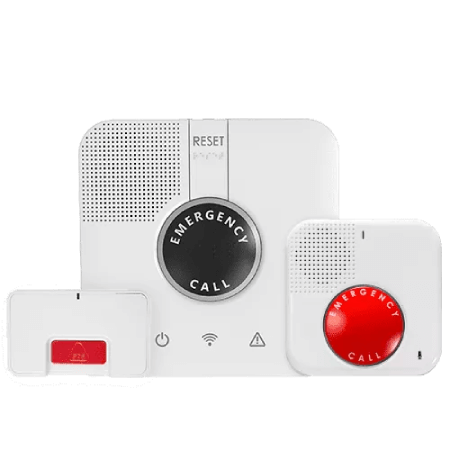
GetSafe
Our Rating:

4.6
Features:
- 24/7 professional monitoring services
- No landline is required for in-home systems
- Voice-activated wall buttons for hands-free help calls
- Fall detection technology
- GPS location tracking in mobile system
- Easy DIY installation
- A caregiver app that allows for monitoring of the user’s status
PROS
CONS
4. MobileHelp
Prime Choice for Mobile Monitoring
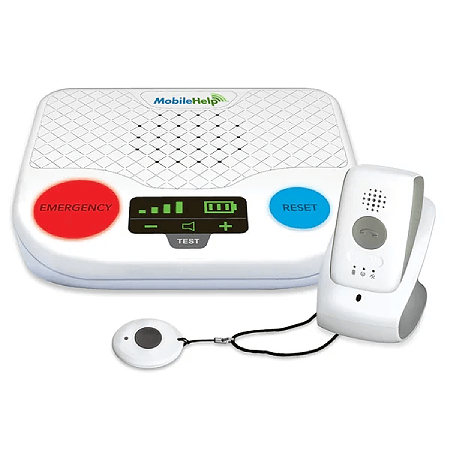
MobileHelp
Our Rating:

4.7
Features:
- 24/7 professional monitoring services
- Fall detection technology
- GPS location tracking
- Mobile and in-home systems are available
- Medication reminders
- Caregiver tracking via an online platform
- Excellent battery life for mobile devices
PROS
CONS
5. One Call Alert
Most Affordable Without Compromising Quality
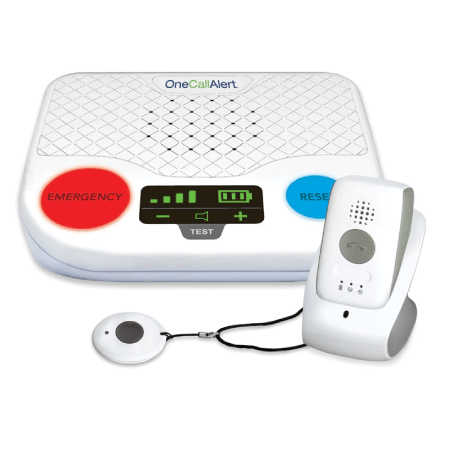
One Call Alert
Our Rating:

4.6
Features:
- 24/7 professional monitoring services
- Fall detection technology
- GPS location tracking in mobile system
- Mobile and in-home systems are available
- Medication reminders
- Excellent battery life for mobile devices
- Two-way communication
PROS
CONS
Details on Optional Features
Each of these systems also provides optional features to further enhance user safety and convenience:
- Medication Reminders: This feature can remind users to take their medications at scheduled times, making it a great tool for those with complex medication regimes.
- Caregiver Tracking: Some systems offer a caregiver app, which allows family members to monitor the user’s location and get notified if an emergency occurs.
- Free Lockbox: This allows emergency responders to access the user’s home without needing to force entry, ensuring a quicker response time during an emergency. The lock box code is only shared with emergency personnel when needed.
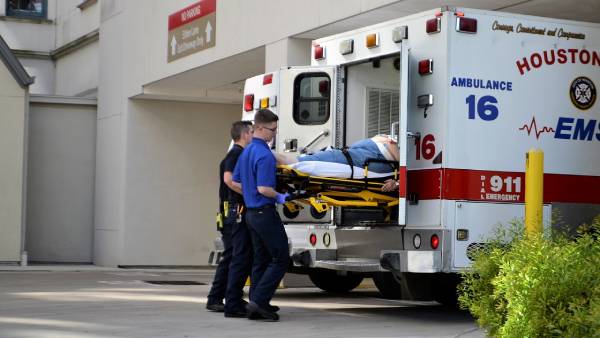
The Role of Medical Professionals and Emergency Responders
When the button on a medical alert device is pressed, a signal is sent to the associated monitoring center. This center operates around the clock and is staffed by trained professionals who can quickly evaluate the situation.
If it’s a medical emergency, they will immediately alert local emergency medical services, providing the necessary information, including the user’s location and any relevant medical history stored in their system. This instant communication saves precious time and allows medical professionals to prepare for the situation before they arrive on the scene.
The Role of Emergency Responders in Providing Immediate Assistance
Emergency responders play an essential role in the medical alert system network. Once alerted, they swiftly mobilize to the user’s location for immediate medical assistance.
This quick response can be the difference between a full recovery and a tragic outcome in rural areas. Emergency responders translate the safety net provided by a medical alert system into life-saving action.
The Role of the Monitoring Center in Facilitating Contact with Emergency Services
The monitoring center is the crucial link between the user and emergency services. Beyond relaying alerts, the monitoring center’s representatives stay on the line with the user, providing reassurance and guidance until help arrives. They can relay important information from the user to the emergency responders and vice versa.
Thus, the monitoring center ensures that every emergency is handled promptly and effectively, offering an invaluable service, especially to users in remote rural areas.
Choosing the Right Medical Alert System: Considerations and Tips
When selecting the best medical alert systems for rural areas, it’s essential to keep a few key factors in mind:
- Connectivity: Ensure that the system works well with the type of connection available in your area (landline or cellular).
- Battery Life: Opt for a system with long-lasting battery life, especially if power outages are common in your area.
- Range: For in-home systems, check the range of the device. The user should be able to send an alert from any part of their home.
- GPS Capabilities: For mobile systems, GPS location tracking can help emergency personnel locate the user quickly, even in less familiar rural areas.
- 24/7 Monitoring: Choose a company that offers round-the-clock monitoring services for immediate assistance whenever needed.
Importance of Understanding the Terms and Conditions
Understanding the terms and conditions is crucial when choosing a medical alert system. Pay close attention to details such as:
- Price Lock Guarantee: This ensures your monthly rate won’t increase over time.
- Activation Fees: Some companies charge a one-time activation fee to start the service.
- Equipment Fees: Find out whether you need to purchase the equipment or if it’s included in the monthly plan.
Knowing these details upfront can help prevent unexpected costs and ensure you get the best value for your investment.
Emphasis on the Importance of Choosing an Affordable Medical Alert System
While features and reliability are important, affordability should also be a key consideration. An effective medical alert system does not necessarily have to be the most expensive one.
Many companies offer systems with robust features at reasonable prices. Always compare prices and features before making a final decision, ensuring that your chosen system fits comfortably within your budget while meeting your needs.
The Impact of Medical Alert Systems on the Users and Their Families
The impact of medical alert systems on users and their families is significant, providing a tangible safety tool and an intangible sense of security and peace of mind.
1. Enhanced Safety and Quick Response Time
Medical alert systems offer a lifeline for immediate assistance in an emergency, ensuring that help is never more than a button press away. These systems can dramatically reduce the response time in an emergency, potentially saving lives.
2. Independence for the User
For older adults or people with medical conditions, these systems enable them to live independently while still having access to immediate assistance if needed. This independence can contribute significantly to the user’s mental well-being and overall quality of life.
3. Peace of Mind for Family Members
Knowing that their loved one has a medical alert system can provide significant peace of mind for families and caregivers. Even if they cannot always be there physically, they know that help will be available promptly in an emergency.
4. Caregiver Assistance
Some systems include features that allow caregivers and family members to monitor the user’s status. Families can stay updated on the user’s well-being and receive emergency alerts.
5. Prevents Unnecessary Hospitalization
With immediate access to help, many situations can be managed effectively at home, avoiding unnecessary hospitalization. The system ensures that users receive the right help at the right time.
6. Ease of Use
Medical alert systems are designed to be user-friendly, even for those who may not be technologically savvy. This ease of use comforts the user and their family, knowing that help can be easily summoned when required.
In essence, the impact of medical alert systems on users and their families is profound, providing a much-needed layer of safety and security, promoting independence, and fostering a sense of control and reassurance during medical emergencies.

The Role of the Caregiver App and Its Benefits to Users and Their Families
The caregiver app is a feature offered by some medical alert companies, allowing family members to monitor their loved ones remotely. Key benefits include:
- Real-Time Alerts: The app notifies caregivers if their loved one triggers an alert or if the system detects a potential problem like a fall. This immediate notification allows caregivers to take swift action if needed.
- Location Tracking: Through GPS technology, the app lets caregivers know the whereabouts of their loved ones, which is particularly helpful for those with dementia who may wander.
- Activity Monitoring: Some apps can monitor activity patterns, offering insight into the loved one’s daily routine and well-being.
By offering these features, the caregiver app brings peace of mind to family members and enhances the overall safety of the user, making it an invaluable addition to any medical alert system.
Future Developments in Medical Alert Systems
The future of medical alert systems is promising, focusing on cutting-edge technology to improve reliability, ease of use, and effective emergency responses, particularly for users in rural areas. Some upcoming developments include:
Artificial Intelligence (AI)
Integrating AI into these systems could enable more sophisticated monitoring, such as predicting potential falls or health emergencies based on a user’s behavior patterns.
Advanced Wearables
Future medical alert devices may become more discreet and comfortable, with features like heart rate monitoring, sleep tracking, and more comprehensive health data collection.
Improved Connectivity
As improvements in rural internet connectivity and 5G technology continue, we expect future medical alert systems to provide even more reliable service in remote areas.
The Potential Impact of These Advancements on Rural Medical Alert System Users
These advancements will bring significant benefits to rural users:
Faster Response Times
Improvements in connectivity and AI could lead to faster detection and reporting of emergencies, resulting in quicker response times.
Proactive Health Monitoring
Advanced wearables could provide real-time health data to users and their medical professionals, helping to detect potential health issues earlier.
Improved Quality of Life
With more reliable, sophisticated systems, users can enjoy greater independence and peace of mind, leading to a better quality of life.
Overall, the future of medical alert systems holds promise for enhancing safety and convenience, significantly improving users’ lives in rural areas.
The Bottomline:
Choosing the best medical alert systems for rural areas is a critical decision that impacts the safety and independence of users. Such systems should offer reliable connectivity, even in remote locations, along with features like GPS location tracking, automatic fall detection, and long battery life for mobile devices. Moreover, understanding the terms and conditions, including hidden costs, is key to selecting an affordable system with excellent value.
Medical alert systems play a pivotal role in ensuring the safety and well-being of individuals living in rural areas. These systems offer a lifeline to medical assistance, especially in emergencies, and give users and their families peace of mind. As technology advances, we can expect even more sophisticated systems to proactively monitor users’ health and predict potential emergencies.
Ultimately, the right medical alert system can differentiate between a quick recovery and a severe medical event. It’s more than just a device—a bridge to help, a guardian of health, and a companion offering reassurance that help is just a button press away.
